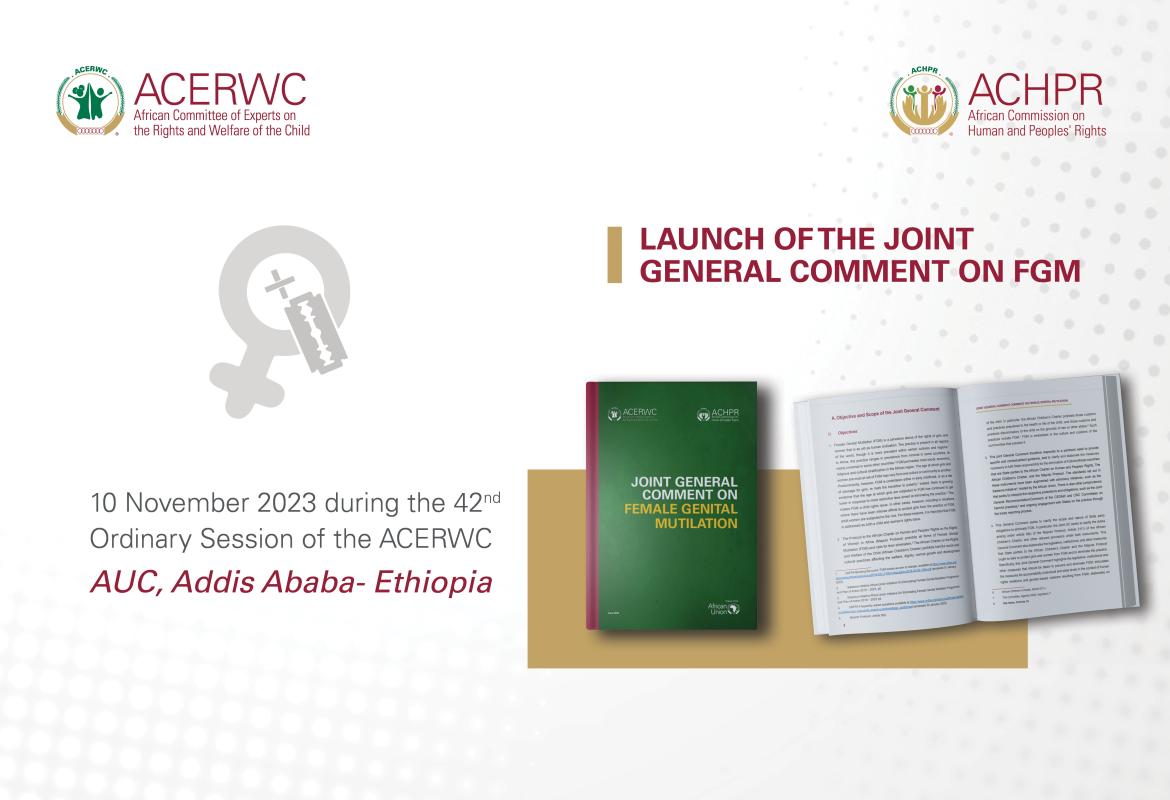Female Genital Mutilation (FGM) is a pervasive abuse of the rights of girls and women that is as old as human civilization. The practice is present in all regions of the world, though it is more prevalent within certain cultures and regions. In Africa, the practice ranges in prevalence from minimal in some countries, to nearly universal in some other countries. FGM permeates most social, economic, religious and cultural stratification in the African region. The age at which girls and women are most at risk of FGM may vary from one culture or community to another. Predominantly, however, FGM is undertaken either in early childhood, or as a rite of passage for girls, to mark the transition to puberty. Indeed, there is growing evidence that the age at which girls are subjected to FGM has continued to get lower in response to more restrictive laws aimed at eliminating the practice. This makes FGM a child rights issue. In other cases, however, including in situations where there have been intense efforts to protect girls from the practice of FGM, adult women are subjected to the vice. For these reasons, it is important that FGM is addressed as both a child and women’s rights issue.
The Protocol to the African Charter on Human and Peoples’ Rights on the Rights of Women in Africa (Maputo Protocol) prohibits all forms of Female Genital Mutilation (FGM) and calls for their elimination.5 The African Charter on the Rights and Welfare of the Child (African Children’s Charter) prohibits harmful social and cultural practices affecting the welfare, dignity, normal growth and development of the child. In particular, the African Children’s Charter prohibits those customs and practices prejudicial to the health or life of the child; and those customs and practices discriminatory to the child on the grounds of sex or other status.6 Such practices include FGM.7 FGM is embedded in the culture and customs of the communities that practice it.
This joint General Comment therefore responds to a pertinent need to provide specific and contextualised guidance, and to clarify and elaborate the measures necessary to fulfil State responsibility for the elimination of FGM to African countries that are State parties to the African Charter on Human and Peoples’ Rights, The African Children’s Charter, and the Maputo Protocol. The standards set out in these instruments have been augmented with advocacy initiatives, such as the Saleema Initiative8, hosted by the African Union. There is also other jurisprudence that seeks to interpret the respective protections and obligations, such as the Joint General Recommendation/Comment of the CEDAW and CRC Committees on harmful practices,9 and ongoing engagement with States on the practice through the treaty reporting process.
This General Comment seeks to clarify the scope and nature of State party obligations to eliminate FGM. In particular, the Joint GC seeks to clarify the duties arising under article 5(b) of the Maputo Protocol, Article 21(1) of the African Children’s Charter, and other relevant provisions under both Instruments. This General Comment also elaborates the legislative, institutional, and other measures
that State parties to the African Children’s Charter and the Maputo Protocol ought to take to protect girls and women from FGM and to eliminate the practice. Specifically, this Joint General Comment highlights the legislative, institutional and other measures that should be taken to prevent and eliminate FGM; articulates the measures for accountability (individual and state level) in the context of human rights violations and gender-based violence resulting from FGM; elaborates on medical, psychosocial, and other support services that should be made available for survivors of FGM; articulates measures that should be taken to prevent and ensure accountability for the cross-border practice of FGM; and the particular considerations to be taken into account in respect of asylum seekers fleeing from their countries due to the threat of FGM, or those who are internally displaced for the same reason.
The development of this joint General Comment acknowledges that, while there is a general acceptance of the legal, normative, and policy frameworks that prohibit FGM at the global, pan-African and national levels, the domestication and implementation of these norms has neither been sufficient, nor uniform across the African region. The disparity between principle and practice, and the failure of these measures to achieve the eradication of the practice testifies to the need for reflection on measures that are specific to the peculiar socio-cultural and economic context in Africa, which addresses both the causes and drivers of FGM in the African context. FGM is a multifaceted practice, with legal, social, cultural, economic, and religious dimensions. This General Comment underscores the need for comprehensive approach to effectively address FGM, beyond the law.
In this Joint General Comment,
“Female genital mutilation (FGM)” means ‘the practice of partially or wholly removing the external female genitalia or otherwise injuring the female genital organs for non-medical or non-health reasons.’
“child” means a human being aged below 18 years of age, even if majority is attained earlier under national law.
“Harmful practices” means all behaviour, attitudes and/or practices which negatively affect the fundamental rights of women and girls, such as their right to life, health, dignity, education and physical integrity.”
“Female Genital Cosmetic Surgeries (FGCS)” involve alteration and/or manipulation of the female genitalia. FGCSs refer to procedures taken to alter female genitalia for aesthetic reasons.







